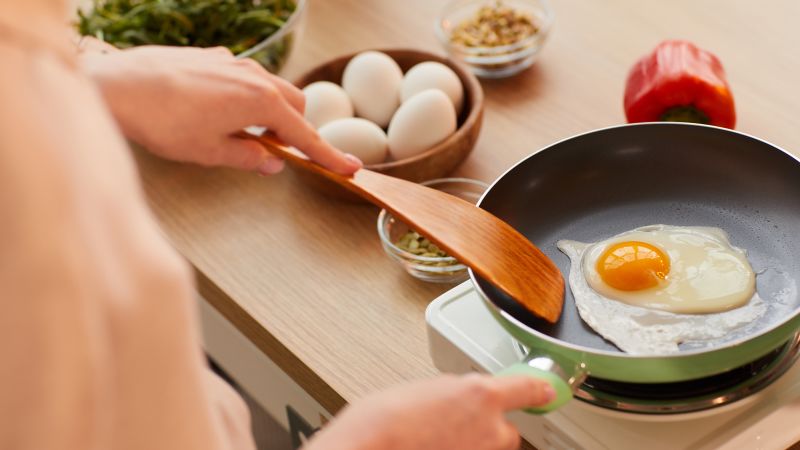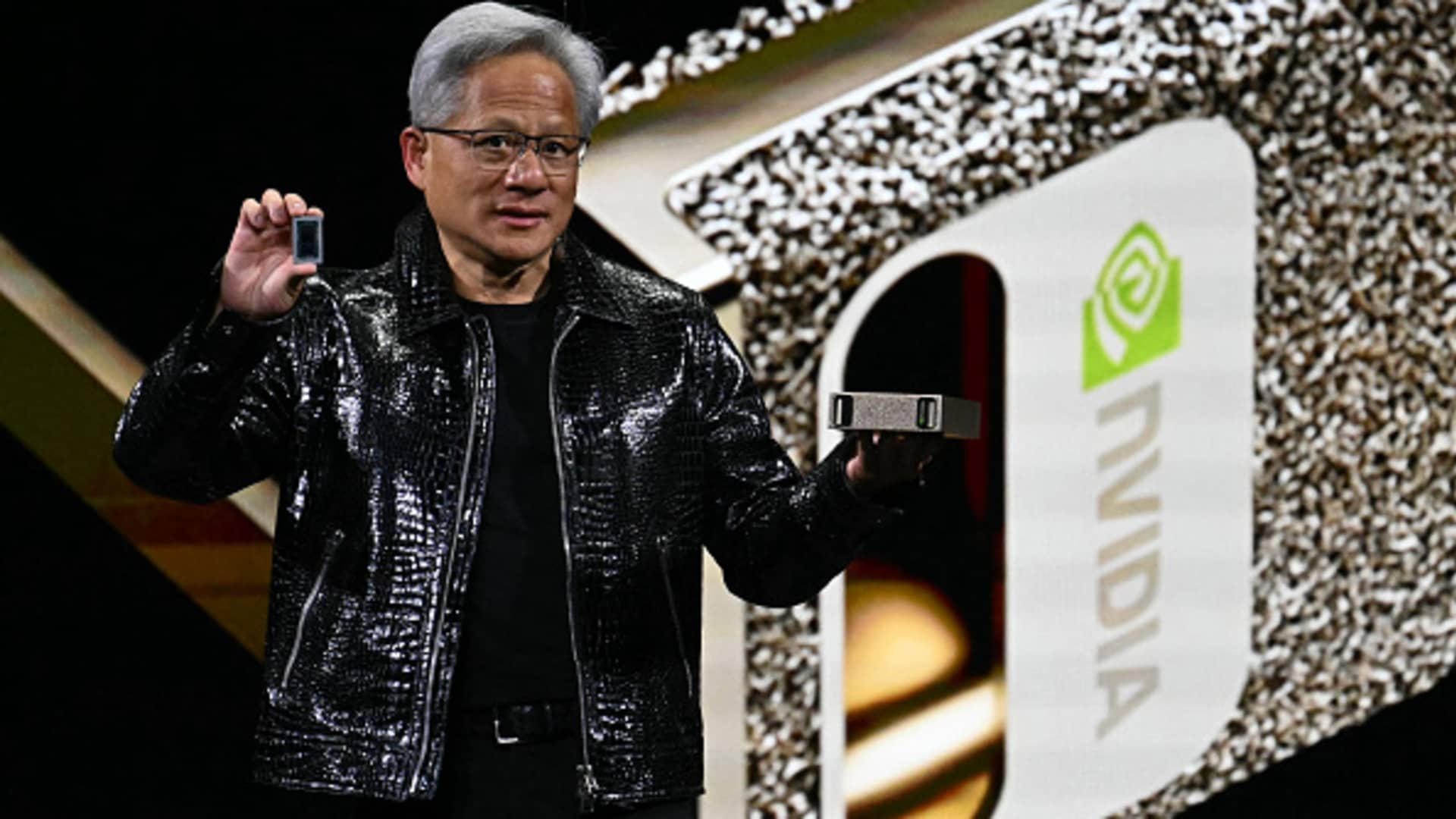
A battle is brewing between California legislators who plan to ban “forever chemicals” from cookware, and celebrity chefs who oppose it — including David Chang and Rachael Ray.
The stars are supported by an industry association, which says the bill is a “targeted attack.”
Nonstick cookware is a staple of kitchens across America. But the satisfying slide of a fried egg or a crispy-edged crepe across these smooth pans is made possible by perfluoroalkyl and polyfluoroalkyl substances — known as PFAS — a class of potentially toxic synthetic chemicals dubbed forever chemicals because they don’t easily break down.
California’s bill proposes a phased-in ban on intentionally added PFAS in a range of products, including cookware, dental floss, food packaging and ski wax. It was approved by the state legislature earlier this month and is now on the desk of Gov. Gavin Newsom, who has until October 13 to sign.
Now, a food fight.
Lawmakers and environmental groups say it’s a public health necessity to regulate PFAS, which in nonstick cookware can produce toxic fumes at high temperatures and can get into food if the coating wears down. The cookware industry and several star chefs say the specific chemicals in the pans are safe.
What’s happening in California is a microcosm of a larger debate over how to regulate the huge number of chemicals we’re exposed to daily — many of which we still know very little about.
PFAS have been used widely since the 1950s and are found in a huge variety of products, prized for their non-stick, waterproof and stain-resistant properties.
The problem is they are extremely persistent chemicals, which accumulate in the environment and people’s bodies, where they can linger in organs for many years. Most people in the US have been exposed to PFAS, and research has linked them to numerous health conditions including cancer, infertility and thyroid disease.
Many scientists have long been sounding the alarm. These chemicals are “the most concerning pollution issue of the century in my opinion,” said Scott Belcher, a professor in the department of biological sciences at North Carolina State University.
“There is no reason why we should allow their use in products that would directly contaminate the food we consume,” said California Sen. Ben Allen, the Democrat who sponsored the bill.
However, a group of high-profile chefs wrote to legislators urging them to oppose the proposed legislation. They say the type of PFAS used in nonstick cookware — called PTFE but better known by the brand name Teflon — is safe and that banning it would unnecessarily punish restaurants, chefs and households.
So, what does the science say?
PTFE is “very inert,” said Thomas Simat, the chair of food science and food contact material at Dresden University of Technology in Germany.
Tests have shown that non-stick cookware can release potentially harmful fumes when heated to temperatures above around 500 degrees Fahrenheit. But people rarely cook at this heat. They are likely to get higher PFAS exposure from the fish they eat than from the pan they use, Simat said.
The much bigger concern is how the chemicals in nonstick pans are produced and the pollution leaching out in the process, scientists including Simat say.
Historically, PTFE was manufactured using another PFAS called PFOA, which has been linked to health problems including cancer, decreased fertility and hormone disruption, but it was phased out of production in the US around a decade ago.
The problem is it’s not clear what chemicals have replaced it.
It’s common practice for industry to “just switch to a different PFAS” and it takes time to analyze the health risks, said Erin Baker, an associate professor at the University of North Carolina who researches PFAS. It’s “like a whack a mole… anytime you’re using any synthetic chemical, you’ve got risk,” she told CNN.
Many in the cookware industry, however, say nonstick pots and pans carry no risk of harm when manufactured responsibly.
“I urge you to look closely at the science before moving forward with legislation that could unintentionally do more harm than good,” wrote Rachael Ray, a celebrity chef and talk show host, who has her own line of non-stick pots and pans. Nonstick cookware is durable, affordable, easy to clean and requires less oil and fat during cooking, she continued.
Celebrity chef David Chang, who founded the Momofuku restaurant group and has designed nonstick pans with Meyer Cookware, said “PTFE, when manufactured and used responsibly, has been proven safe and effective in both professional and home kitchens for more than half a century.”
Thomas Keller, who owns the French Laundry restaurant in Napa Valley and has designed nonstick pans with Hestan, wrote that “removing these tools without a clear, fact-based foundation risks taking away an important option for cooks.”
The letters were published online by the Cookware Sustainability Alliance, an industry body which contacted chefs and others in the sector to make them aware of the proposed legislation.
California’s bill “is based on the false premise that all PFAS chemicals are hazardous,” said Steve Burns, the alliance’s president, who called it “a targeted attack on safe cookware” motivated by “politics and not science.”
He said emphasis should be placed on chemical companies for accountability for any pollution during the production process, but “the chemical producing companies are nowhere to be seen in this legislation,” he told CNN.
The proposed ban will harm ordinary people, he added. The “lack of concern for increasing costs for people feeding their families is frankly baffling to us,” he said, arguing PFAS-free alternatives cost more, although the ban wouldn’t require people to throw out their nonstick pots and pans.
California would not be the first state to ban PFAS from cookware. Others including Minnesota, Colorado and Connecticut, have already passed legislation to phase it out.
Outside the US, France passed a ban on PFAS in a slew of products in February. But while cookware was included in the original draft, it was exempted from the final text after protests from cookware companies and their employees, who argued the ban would jeopardize jobs and was unnecessary on health grounds.
Industry pushback is common when it comes to regulating chemicals, UNC’s Baker said. “Until we prove that it’s causing a cancer or some kind of (health condition) they want to keep running with that product.”
There are plenty of PFAS-free alternatives available, including cast iron, NCSU’s Belcher said, which are “durable, they work extremely well, and you can hand them down for generations.”
Ultimately, it’s about trade-offs, he said. “The period of non-stick is convenient, but you really have to ask, is the toxicity of these chemicals worth the potential risks?”



